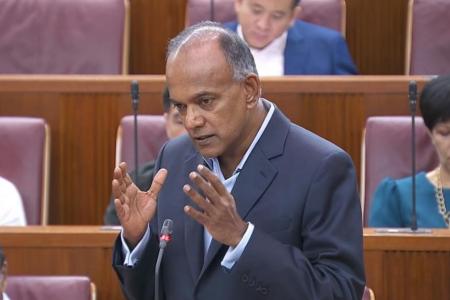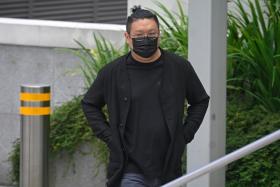No ‘free passes’ for student sex offenders: Shanmugam
Minister tells Parliament how police handled 37 sexual misconduct cases in universities over last 3 years
Sex offenders will be liable for their actions even if they are university students, Law and Home Affairs Minister K. Shanmugam said yesterday.
Addressing questions on sexual misconduct in university campuses, he told Parliament that the police take a balanced approach towards such cases.
"Some have been prosecuted. Depending on facts, others have been give a second chance. There are no 'free passes' to university students, or for anyone else," he stressed.
The question of whether student sex offenders were treated differently was raised online after National University of Singapore (NUS) undergraduate Monica Baey, 23, complained on social media that the student who filmed her showering in a campus residence had got off lightly.
Explaining how the police and Attorney-General's Chambers (AGC) approach such cases, Mr Shanmugam highlighted situations where leniency was exercised or not.
The six autonomous universities received 56 reports of sexual misconduct by students in the past three academic years, starting from 2015/16, he said.
The victims in 37 cases made police reports. Two cases had insufficient evidence and four are still under investigation.
Of the remaining 31 cases, 16 were prosecuted in court, with 10 resulting in jail sentences and four with supervised probation. One case was given a discharge not amounting to an acquittal, and the convicted offender in another case is awaiting sentencing.
Of the 15 cases not taken to court, two were given a stern warning. The other 13 were given a conditional warning, meaning that if they commit another crime during a stipulated period, they will be charged with both offences.
Stressing that a conditional warning does bear weight, Mr Shanmugam cited Miss Baey's case, in which the perpetrator, NUS student Nicholas Lim, 23, was issued a year's conditional warning by the police.
"I should point out that Mr Lim is on thin ice, with his conditional warning... A conditional warning has been an effective deterrent for perpetrators who have had good propensity to reform," he said.
Only one of the 13 cases given a conditional warning went on to commit another crime - an NUS student who was warned for a voyeurism offence in 2015 and re-offended in 2017. He was prosecuted in court for both offences and sent to jail for eight months and fined $2,000.
Noting that protecting the victim was vital, the minister said: "The criminal legal framework must deal with the offender in a way that ensures the specific victim's safety, deal with the specific offender, and deter other would-be offenders."
When a woman's privacy is violated, follow-up actions must ensure she is treated with dignity and respect, with her concerns addressed and support given to her, he added.
Mr Shanmugam also stressed no leniency would be shown in such cases where the offender masked his face, covered closed-circuit TV cameras or used other means to evade detection.
Education Minister Ong Ye Kung, who also fielded questions on the issue from MPs yesterday, said 14 of the 56 cases had occurred off campus.
Noting that two-thirds of the total cases were related to voyeurism, such as Peeping Tom incidents and filming of people in vulnerable positions, Mr Ong emphasised the need to tackle the growing concern of voyeurism.
Calling for the universities' disciplinary processes to be "stringent but fair", he said: "We need to better balance the objectives of deterrence and redress for the victims against the rehabilitation of the offender.
" (This) is important for an education institution, but it should not end up with penalties that are too soft and too lenient."
Mr Ong noted the number of cases for each university is closely related to student numbers, with the 25 in NUS and 20 in Nanyang Technological University making up the bulk of the 56 cases.
The universities also carry out their own disciplinary processes and mete out a combination of penalties, including official reprimand that will be reflected in a student's educational record, suspensions and expulsions.
Of the 56 cases, five are pending hearings and four students quit before sanctions were imposed, Mr Ong said.
Of the remaining 47 cases, 34 were officially reprimanded, 26 suspended for up to two academic terms, and 20 banned from entering students' dormitories.
He said that while "two strikes and you're out" cannot be applied across the board, expulsion must also not be the default for all forms of misconduct.
"We must ensure that potential offenders know the severe consequences of their actions, including the impact on their future," he said. "We should always refrain from trial by media, doxxing and resorting to mob justice."
FOR MORE PARLIAMENT REPORTS, READ THE STRAITS TIMES TODAY
Get The New Paper on your phone with the free TNP app. Download from the Apple App Store or Google Play Store now



